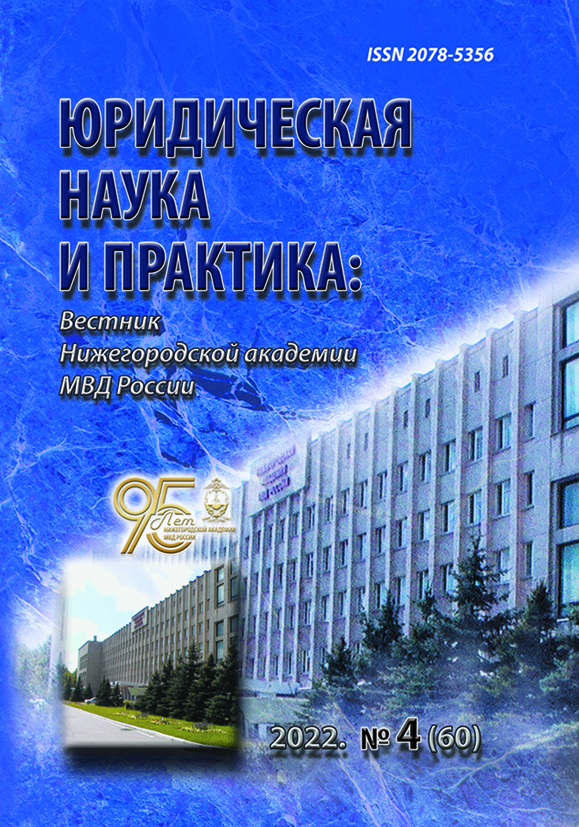Russian Federation
Operational-investigative activity (hereinafter — ORD) rightfully occupies one of the leading places in the fight against crime, especially with its hidden, non-obvious forms. The main content of the practical OSA is the processes of detecting and solving crimes, documenting criminal activities. In turn, the main task of the theory of ORD is the scientific support of the practical activity of the same name. This manifests the dialectical relationship between operational-search theory and practice. Within the framework of the presented article, an attempt was made to consider scientific approaches to the formation of the theoretical foundations for detecting and solving crimes, including through the prism of the achievements of a related legal discipline — forensic science. Also identified are the existing scientific problems that lie in this plane, including those related to the possibility and expediency of forming a unified general theory of detection and disclosure of crimes, as well as the development of operational-search methods for combating crime.
theory of operational-investigative activity, forensic science, theory of detection and investigation of crimes, private operational-investigative theory, methods of disclosure and detection of crimes
1. Theory of operational investigative activity: Textbook. 2nd edition, reprint. and additional / ed. by K. K. Goryainov, V. S. Ovchinsky, G. K. Sinilov. Moscow: INFRA-M Publ., 2012. 690 p. (In Russ.)
2. Klimov A. I. Operational-investigative activity of internal affairs bodies as a process of cognition (problems of theory and practice). Author’s abstract... doctor of legal sciences. Moscow, 1995. 49 p. (In Russ.)
3. Vatanen T. V. The process of cognition as the basis of operational investigative activity. Actual research, 2021, no. 21 (48), pp. 35-38. (In Russ.)
4. Cheburenkov A. A. Fundamentals of the theory of investigation: monograph. Moscow: Yurlitinform Publ., 2010. 176 p. (In Russ.)
5. Kornoukhov V. E., Bogdanov V. M., Zakotov A. A. Fundamentals of the general theory of criminalistics. Krasnoyarsk: Krasnoyar. university Publ., 1993. 152 p. (In Russ.)
6. Lavrov V. P. Private forensic theories: current state and development trends. Proceedings of Tula State University. Economic and legal sciences, 2016. no. 3-2, pp. 85-90. (In Russ.)
7. Gerasimov I. F. Some problems of crime detection. Sverdlovsk: Sredneuralskoe book Publ., 1975. 183 p. (In Russ.)
8. Rakhmatullin R. R. Private criminalistic theory of crime detection as an impulse to improve crime detection. Man: crime and punishment, 2019, no. 3, pp. 352-358. (In Russ.)
9. Belkin A. R. Theory of proof. Scientific and methodological manual. Moscow: NORMA Publ., 1999. 429 p. (In Russ.)
10. Bilyaev V. A. On the epistemological nature and interrelation of operational investigative activity and criminal process. Scientific notes of the V. I. Vernadsky Crimean Federal University of Legal Sciences, 2019, vol. 5 (71), no. 4, pp. 126-138. (In Russ.)
11. Belkin R. S. Criminalistics and theory of operational investigative activity. Collection of scientific papers of the Omsk High School. Omsk, 1973. No. 12. Pp. 11-21. (In Russ.)
12. Markushin A. G. Theoretical foundations of operational investigative activity and its legal regulation /. Nizhny Novgorod, 1992. 48 p. (In Russ.)
13. Zelensky V. D. On the concept and content of the organization of crime investigation. Criminological Journal of the Baikal State University of Economics and Law, 2015, vol. 9, no. 4, pp. 734-744. (In Russ.)
14. Ezrokhin P. V. Operational investigative activity of criminal investigation units to counter organized crime as a private scientific theory. Scientific portal of the Ministry of Internal Affairs of Russia, 2020, no. 3 (51), pp. 73-79. (In Russ.)
15. Pozdnyakov A. N. On the question of private theories in operational investigative science: theory of operational investigative activities to combat ethnic crime. Krasnodar: Historical and socio-educational thought, 2016, vol. 8, no. 3, part 1, pp. 132-136 (In Russ.)
16. Lavrov V. P. Private forensic theories: current state and development trends. Proceedings of Tula State University. Economic and legal sciences, 2016, no. 3-2, pp. 85-90. (In Russ.)
17. Klimov A. I., Tuzov L. L., Sazonova N. I. Methodology of theory and practice of operational investigative activity. Scientific portal of the Ministry of Internal Affairs of Russia, 2009, no. 1, pp. 55-66. (In Russ.)
18. Larichev V. D. Theoretical model of operational investigative activity for the identification and documentation of economic crimes against property: monograph. Moscow: FGKU “Research Institute of the Ministry of Internal Affairs of Russia” Publ., 2016. 158 p. (In Russ.)
19. Davydov S. I. On standard recommendations for resolving operational investigative situations of crime detection. Legal Lawer, 2010, no. 4 (41), pp. 27-32. (In Russ.)
20. Criminalistics: features of the investigation of certain types of crimes: a course of lectures / comp.: Yu. L. Boyko, O. V. Kruglikov. Barnaul: Barnaul law institute of the Ministry of Internal Affairs of Russia Publ., 2012. Part 1. 228 p. (In Russ.)
21. Podopolny N. A. Advanced private methodology of crime investigation. Russian investigator, 2011, no. 14, pp. 5-7. (In Russ.)
22. Belkin R. S. Course of criminalistics: General theory of criminalistics. In 3 vols. Moscow: Lawyer Publ., 1997. Vol. 1. 512 p. (In Russ.)












